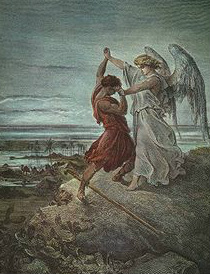In this week's Torah portion (Vayishlach), Jacob is furious over the way he has been treated by his uncle/father-in-law. Without telling Laban, he packs up his large family and all of his belongings to return to the place he had fled as a youngster. It is on the final leg of the journey back to Be'er Sheva that Jacob sends his family ahead and spends the night in a wrestling match:
Jacob was left alone and a man wrestled with him until daybreak. When he saw that he was not able to defeat him, he struck his hip at its socket, and Jacob strained the socket of his hip while wrestling with him. He said, “Let me go, for the day is breaking.” But he said, “I will not let you go unless you bless me.” He said to him, “What is your name?” He said, “Jacob.” He said, “Your name will not be Jacob anymore, but Israel, for you have striven with God and with humans and were able.” Jacob asked, “Please, tell me your name.” But he said, “Why should you ask my name?” And he blessed him there. Jacob named the place Peniel, saying, "I have seen God face to face, yet my life was saved.” (Genesis 32:25-31)
In most artists' depictions of the wrestling match (like the one above by Gustave Doré), Jacob's opponent looks like an angel, complete with wings and an effortless mastery of the struggling Jacob. But that is not the way the scene looks to me in the biblical text. The Torah never says that the man is an angel. What is more, the text makes it clear that neither wrestler can defeat the other. Their battle is a struggle for both of them. In fact, they appear so equal that there is a confusion of the pronouns in the Hebrew that makes it uncertain which lines of the dialogue are spoken by Jacob and which are spoken by "the man."
What's going on here?
Clearly, "the man" is not an ordinary fellow. After the match, Jacob gives the place a name that means "Face of God," and he himself is given a new name that means "Strives with God." Somehow, Jacob believes that he has wrestled with God, but how can that be? Is Jacob really strong enough to be evenly matched with God? Why is it that the text goes out of its way to say that Jacob was "alone" in the same verse it says that he wrestled with a man? How can you wrestle with someone else when you are alone? Why does the man mock Jacob's simple request, "Tell me your name"? Is he suggesting that Jacob already knows it?
Perhaps the wrestling match ends in a draw because Jacob actually is wrestling an opponent with whom he is perfectly evenly matched…himself. Jacob wrestles with his own conflicting identity. Who will he be? Will he be a cheater and a liar like his Uncle Laban? He has been that. Will he always be cowed by father figures who do not see him for who he truly is? That was his experience with his real father, Isaac, and, until he left him, it was his experience with Laban, too. Will he always be the person who runs away from his problems?
Jacob is at the crossroads of his life. He is at one of those moments when people feel the need, once and for all, to take a stand and to take charge of their own identity. He needs to find his own name.
Have you had such a moment? In that moment, did you find yourself arguing for and against each possibility? With whom were you arguing, if not with yourself?
How often does it happen in our lives that we find ourselves torn by our conflicting needs and desires! We wrestle with ourselves, as Jacob did. And how is it possible that anyone can "win" a wrestling match with him or herself? What does victory even look like? If you win, is it not necessary that part of you must lose?
The victory that Jacob earned—the one that made him and the Jewish people merit the name Israel, "Strives with God"—is that he wrestled at all. After this story, Jacob does not change much. He remains a bit of a swindler, a bit blind to his faults, and he will be again a bit of a coward in confronting a threatening adversary. But he will never again run from himself. Jacob's merit—and perhaps ours, too—is that he is willing to confront his own complicated, contradictory and fallible self. He puzzles over life's unanswerable questions and tries, as best he can, to come up with ways to be true to himself and to be the best person that he is able to be.
In this world of imperfection and limitation, that may be the closest we can get to seeing the face of God.
Other posts on this topic:
"Not One of Them Was Left"


 RSS Feed
RSS Feed
